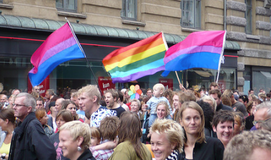 Image: Charles Hutchins
Image: Charles Hutchins Well. On that very basic premise, it seems like Julie Bindel and I might be on the same page. That would shock me, if it wasn't for the fact that very quickly it becomes apparent that in fact we are, as ever, in completely different books. On opposite shelves. In libraries built very far apart.
Her article, and the survey, refers to "people who are not straight". But that's not actually what it is about. There are no questions about bisexuality, or pansexuality, or even about people who feel their sexual orientation has shifted over their lifetime. This is a world where you are straight, or you are gay or lesbian. Full stop.
I took a gander at the survey; I even started filling it in. But how to respond? Here's a question asking if I ever faced any abuse after coming out. Why yes - I was very vocal about being bi from the age of about 17 and there was that memorable day a group of boys from my school followed me and a male friend who also identified as bi and decided to cheer us on by throwing gravel and clumps of soil at us. So I can talk about that in the survey, but then I'm immediately asked how I responded to this "homophobic" abuse. I used the comment box to say it was biphobic abuse, and another comment box toward the end of the survey to detail at length why I had problems with something that purports to look at experiences outside of 'straight life' totally erasing so many people's lives and experiences.
| And that's only the start. Bindel has a well documented history of transphobia; of saying that trans women are not really women. So while there's a question about gender identity at the start of the survey, I wonder how that's going to even be used. | What I do know is, if I was going to trust someone to examine this in any detail and with any accuracy, it wouldn't be Bindel. |
Perhaps the lesbian community in which Bindel came out felt homogenous. It certainly seems, from her writing and other people's, that it was very different from the queer community I know and love today. Perhaps that's done purely to time - perhaps to more voices being heard; more space for those who have been marginalised even within marginalised groups.
What I do know is, if I was going to trust someone to examine this in any detail and with any accuracy, it wouldn't be Bindel.
This is the same woman who wrote a scathing reply to the recent spate of articles looking at polyamory as a viable and potentially empowering way to live, arguing that it "does women no favours". Ignoring the fact that many of us engaged in polyamory are also feminists, and there are a large proportion of genderqueer and non-binary people living this lifestyle, she focused on the idea that it's just another way for men to get their rocks off while trapping women.
Throughout that article there seems to be meandering between the terms 'polyamory' and 'polygamy', which mean very different things. This is not someone I trust to grasp nuance.
So why rant? Why not just avoid the book when it's published?
Because I want to add a voice, however small, to those looking at things in a different way. Because my heart sinks every time I see the Guardian are, for whatever reason, still paying her to write and promote herself (it's one of the reasons I stopped buying the paper, even if I haven't yet broken the habit of reading it online). This is my platform, and I'd like to be heard.
Liv
 RSS Feed
RSS Feed
